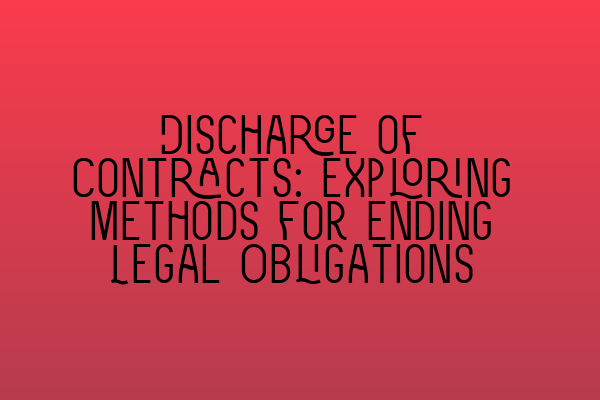Welcome to SQE Contract Law, your source for all things related to contract law and legal obligations. In today’s blog post, we will delve into the topic of Discharge of Contracts – exploring methods for ending legal obligations. Whether you’re a solicitor, law student, or simply interested in contract law, this article is for you.
Contracts are legally binding agreements that outline the rights and obligations of parties involved. However, there are circumstances where contracts can be discharged, or terminated, freeing parties from their legal obligations. Understanding the various methods of discharge is crucial for legal professionals in advising clients and ensuring that contracts are properly terminated.
1. Performance
The most straightforward method of discharge is through performance. This occurs when both parties fulfill their obligations as outlined in the contract. Once the terms have been met, the contract is considered discharged, and the parties are no longer bound by its terms.
However, it is important to note that strict performance is not always required. In many cases, substantial performance – where the essential terms of the contract have been met, but there may be minor deviations – is sufficient for discharge. The court will consider factors such as good faith and reasonableness when determining whether substantial performance has occurred.
If you’re interested in testing your knowledge of SQE Contract Law, check out our SQE 1 Practice Exam Questions.
2. Agreement
Another method of discharge is through agreement. This occurs when parties involved in a contract mutually agree to terminate the agreement before performance is complete. The terms of the agreement to discharge must be clearly communicated and accepted by all parties for it to be legally effective.
It is essential to record any agreement to discharge in writing to avoid any future disputes. Including specific termination clauses in contracts can also provide clarity and set out the conditions for termination. Solicitors should ensure that their clients understand the implications of termination and the legalities involved in the discharge of contracts through agreement.
For further practice and assessment, take a look at our SQE 1 Practice Mocks FLK1 FLK2.
3. Frustration
Frustration is a method of discharge that occurs when unforeseen events render the contract impossible to perform or significantly change the anticipated benefits of the contract. Frustration releases parties from their obligations and can occur due to events such as force majeure, unforeseen circumstances, or the death of one of the parties.
It is important to note that frustration must be genuine and not a result of party negligence or fault. Courts will review the circumstances surrounding the contract and determine if frustration is an appropriate method of discharge. Therefore, seeking legal advice is essential in cases of frustration to ensure that parties are rightfully discharged from their obligations.
To enhance your understanding of SQE Contract Law and prepare for the qualifying exams, consider enrolling in our comprehensive SQE 2 Preparation Courses.
4. Breach
Breach of contract occurs when one party fails to perform their obligations as outlined in the contract. In cases of breach, the innocent party may choose to terminate the contract and seek legal remedies. However, it is important to carefully review the terms of the contract and consult with a solicitor to ensure that the breach is substantial enough to warrant termination.
Sometimes, contracts may include penalty clauses or liquidated damages provisions, which outline the consequences for breach. These provisions can provide clarity on the rights and remedies available in case of breach.
5. Operation of Law
Lastly, contracts can be discharged by the operation of law. This occurs when circumstances outside the control of the parties result in the automatic termination of the contract. Examples include bankruptcy, illegality, or the expiry of a fixed-term contract.
In these cases, the discharge is not dependent on the actions or agreement of the parties involved. However, it is crucial to ensure that the discharge is indeed a result of the operation of law and not due to any actions or negligence of the parties.
For comprehensive preparation materials and courses for the SQE exams, check out our SQE 1 Preparation Courses.
Understanding the methods of discharge is essential for legal professionals in navigating contract law and advising clients. Each method holds its own complexities and implications, and careful consideration must be given to ensure that parties are legally discharged from their obligations.
Remember to stay updated on the latest SRA SQE Exam Dates to ensure you are well-prepared for your exams.
We hope this article has provided you with valuable information on the discharge of contracts. If you have any further questions or require legal assistance, please do not hesitate to contact SQE Contract Law.
